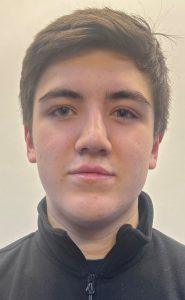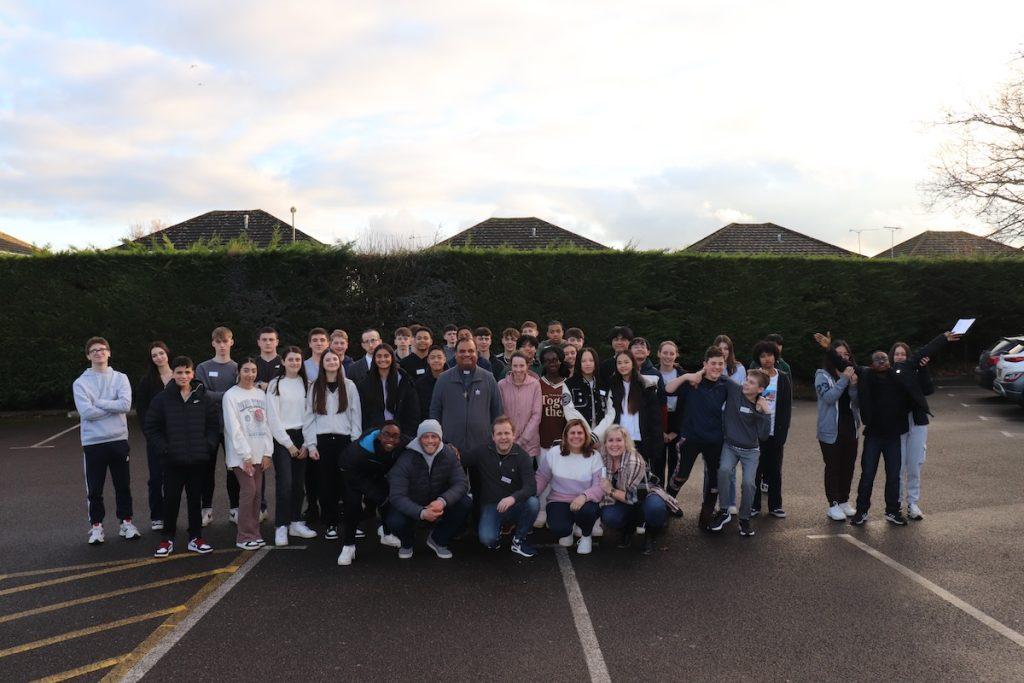On Saturday the 24th of February, from 10am to 5pm, the confirmation group of 35 youngsters gathered for their first retreat, led by Fr Anthony Lobo SDB and the catechists, on the theme of ‘The Real Presence of the Eucharist’. The retreat was followed by Eucharistic Adoration from 5-5:30pm and then the youth mass from 5:30pm, prepared by the catechists and youngsters .
The focus of the Confirmation day retreat was to understand the Real Presence of the Holy Eucharist. The day was split up into 3 sessions. At the start of each session the candidates watched a 30 minute video, and then divided in groups while the catechists went through the booklet material prepared by Fr Anthony from the Augustine Institute, which stimulated the candidates to reflect. Based on the information from the video, this also provided the candidates with further clarification and information, as well as answering any questions they had.
Session 1 The first session was on the Real Presence of Our Lord and Saviour, Jesus Christ, in the Eucharist. We started the session with an opening prayer, from St Francis de Sales. After the prayer, the catechists asked the candidates some questions, for example: “what comes to mind when you think about God’s love for you?”.
After the initial questions on this session, we went into discussing the question, “what is a sacrament?” For the answer we looked towards the Catechism of the Catholic Church; the Catholic Church defines the sacraments as “efficacious signs of grace, instituted by Christ and entrusted to the Church, by which divine life is dispensed to us” (CCC 1131). We then went into further detail on what the sacraments of the Church are: “they are visible, tangible signs that make present to us the invisible, supernatural actions of Christ.” This is because God desires that we intimately know his love and the presence and the power of his grace, “and these sacramental signs allow us all to experience in a real and human way God’s gift of divine love and grace”. We then went into detail on what grace is (see CCC 1129;1134), and also explored how it is actually Jesus at work in the sacraments, and that although we hear and see the priest speaking the words and performing the actions, it is really Jesus who is working through the sacraments to offer us the grace he won for us through his sacrifice on the cross (see CCC 1084-85).
We then answered the question: “How do I know the sacraments work?” The candidates then learned that the sacrament act ex opera operato, means “by the very fact of the actions being performed” (see CCC1127-1128). We then reiterated that the power of the sacraments comes from Christ, and that just as the visible signs of the sacraments are humble, everyday things – water, oil, bread, wine – the effects of the sacraments are often hidden and imperceptible. And that even with great faith and an open heart, we may not always feel fed when we receive the Eucharist, but the Eucharist is the body, blood, soul, and divinity of Jesus Christ, and if we are properly disposed to receive this sacrament with reverence, it will nourish us whether we feel it or not.
We then looked at some martyrs and heroes of the Eucharist:
- St Philip Neri: Rome, Italy, died 1595 AD
- St Tarcisius: Roman Empire, died 275 AD
- St Edmund Campion: England, died 1581 AD
- Young Girl (Anna Wang): China, died 1900 AD
- St Clare: Assisi, Italy, died 1253 AD
May the actions of these martyrs and heroes of the Most Holy Eucharist continue to inspire Catholics to this day, to stand up for their faith and fight for Christ.
We then asked the candidates “How have you experienced God’s presence in your life?” Some responded with answers like “in prayer” and others with “at mass in the Eucharist”. We also looked at the verses in holy scripture where Jesus talks about the Eucharist and his real presence in it, most notably in John: Chapter 6, at the feeding of the five thousand, which was a significant point in Jesus’ ministry.
After the first session, Fr Anthony showed the candidates the Missal and the Lectionary and explained how to use them to the candidates. Fr Anthony also showed the candidates the chalice and the ciborium, and explained their role in the Mass. After this the candidates were given a break so they could catch up with their friends and have some snacks before the second session.
Session 2 The second session was focused around the Story of the Holy Eucharist. This session opened with another prayer this time it was the Anima Christi.
The first part of the second session was a discussion on stories: about their power and how they “not only speak to our minds, but also to our hearts”. We then went on to talk about how God is the master storyteller, and how he “authors his great love story not only with words, but with deeds” and how those deeds throughout the history of the world make up the incredible narrative of salvation, which culminates in the Paschal mystery. We also talked about Jesus’ teachings throughout his ministry on earth: how they prepare us for the moment he offers himself for and to each and every one of us, and how his actions fulfil his promise that “my flesh is food indeed, and my blood is drink indeed” (John 6:55).
We then discussed in our groups – what our favourite story was and why – and after sharing our answers with the group, we began to answer a second question: “where does belief in the Eucharist come from”. To begin answering this question we looked at the Old Testament.
Holy Scripture reveals that at the start of creation mankind was made for intimate communion with God and was destined for eternal life. This reality is revealed to us in the context of a meal – Adam and Eve’s access to the tree of life that was in the centre of the Garden of Eden (see Genesis 2:9, 3:22). We also talked about how, because of Adam and Eve’s original sin, they were exiled from the garden and were no longer able to walk with God or to have access to the tree of life or its fruit. This represented Adam and Eve losing communion with God and losing eternal life. However, through the perfect sacrifice of Jesus Christ, the cross becomes the new tree of life which once again offers communion with God and eternal life everlasting. It is the Holy Eucharist that becomes the fruit of this new tree of life.
The Eucharist in the Old Testament We also see the Eucharist in the Old Testament when Melchizedek, King of Salem, (renamed Jerusalem in 2000 BC) and the “priest of God Most High”, offers a sacrifice of bread and wine in thanksgiving for Abram’s victory over his enemies (see Genesis 14:18-20).
Jesus, the “King of Kings” (Revelation 19:16) and “great high priest” (Hebrews 4:14), changes bread and wine into his body and blood at Jerusalem, and offers them as the perfect sacrifice to the Father (Hebrews 10:1-18). The examples continue, but I shall run out of space and time if I attempt to list them all.
The Eucharist the New Testament Throughout Christ’s ministry on earth, he prepared his followers for the Eucharist even before its institution at the Last Supper. During Jesus’ very first miracle, the wedding at Cana (John 2:1-12) Jesus turned water into wine, and this pointed towards the greater miracle of changing wine into his Precious Blood at the Last Supper. Also, on more than one occasion, Jesus multiplies loaves of bread to feed vast multitudes of people (Matthew 14:13-21; 15:32-39; Mark 6:30-43; 8:1-10; Luke 9:10-17; John 6:1-14). This miraculous provision of natural foods points towards Christ’s provision of his own body as food for the whole world through the Eucharist. Jesus further points towards the Eucharist in his famous bread of life discourse when he tells his followers, rather explicitly, that he will provide his own flesh and blood as true food and true drink and that this supernatural food will give us eternal life (John 6:22-71). The examples continue. It is the Eucharist that strengthens us to follow the instructions that Jesus gives at the Last Supper: to love and serve one another, and to obey his commands (John 13-17).
After learning what Sacred Scripture tells us about the Eucharist, we then looked at what sacred tradition and the teachings of the magisterium tell us through The Catechism. The Catechism tells is that, “The Eucharist is the memorial of Christ’s Passover, the making present and the sacramental offering of his unique sacrifice in the liturgy of the Church which is his Body” (CCC 1362).
The Catechists then reminded the candidates that every time the Mass is celebrated, it really and truly makes present Jesus’ sacrifice at Calvary: how the once and for all sacrifice of Jesus on the cross is made present to us again, so that we may participate in it and be transformed and saved by it: and that with the whole Church, each of us is united to Christ in his one sacrifice, so that we may be able to make a perfect offering to the Father.
Discussion Time After learning about the story of the Eucharist, we began to discuss the connections between Passover and the Eucharist, and what this teaches us about the Eucharist, as well as how we participate in the perfect offering of the sacrifice of the Eucharist. We then asked the candidates: “Why do you receive the Eucharist? What do you hope to expect from this sacrament and what do you expect it to accomplish in you?” The most common answer in my group to these questions was: “The Eucharist brings us closer to God and leads us towards heaven and salvation.” After this question we further delved into the fruits of the Eucharist.
Fruits of the Eucharist:
- It draws us closer to Christ.
- It strengthens us in love.
- It unites us more closely to the Church and to the Body of Christ.
- It cleanses us from past sins and helps us to avoid sin in the future.
- It nourishes and replenishes the life of grace we received in baptism, just as regular food nourishes our physical life.
- It helps us to see Christ in the poor and to care for them.
After the discussion on the fruits of the Eucharist we closed the session with another prayer, this time from St Thomas Aquinas.
After the end of the 2nd session, it was time for lunch. For lunch there was pizza, sandwiches and lots of other snacks that had been provided for the candidates and the catechists. During lunch there were mini games of football outside, as well as some passing about of a rugby ball and some line outs.
After lunch had ended, Fr Anthony spent some time explaining the different objects that are used in mass and the difference between the items, as well as their purpose. After this there was a presentation on Carlo Acutis led by Guillaume, as well as Rachel, Aaron and Ethan. The PowerPoint presentation in at the end of this post.
Session 3 Just as the other two sessions started with a prayer so did the third, this time one adapted from The prayer of Saint Padre Pio after Communion. After we meditated on this beautiful prayer, we began to discuss the importance of food in our lives as it is our most basic need, and how without it there is no life. We also talked about how our bodies let us know when we need food, with an indispensable hunger almost impossible to ignore. The Eucharist is even more vital to our lives, moreover our spiritual life.
God saved the Israelites from starvation in the wilderness by providing them with manna to eat. Without that manna the Israelites would have surely died and this reaffirms its importance. However, to Catholics, the Eucharist is even more important than manna, and this is because it sustains us and strengthens us, and it helps us to turn away from sin. The Eucharist is life; it is the body, blood, soul and divinity of our Lord Jesus Christ and without it we are helpless. The Eucharist is, as Monsignor Ronald Knox put it, “the day’s food for the day’s march”.
We then discussed, in our groups, particular journeys we had undertaken and if we had ever been really hungry or tired during them, and how that experience felt or would have felt. We saw how the absence of food hinders us in our physical lives. So, too, does a lack of the Eucharist hinder us in our spiritual lives.
Each and every one of us has a thirst in our soul for God and the Holy Eucharist. The thirst we all feel in our souls can only be filled by God: not by drugs, food, or by lust. Therefore, we must receive the Eucharist with reverence as it acts as the key to salvation; it is the sustenance for our soul. A part of this reverence is our participation in the Mass. We explained how coming together as a community in the Mass acts as a public witness that we belong to Jesus, and to his body the Church. It also acts as a public testimony of our faith in God and our hope of salvation.
We then spoke of how sometimes it seems it is just the priest, deacon, altar servers and perhaps the choir “doing” the Mass, while the rest of the congregation is just merely the audience. However, the Catechism tells us that “it is the whole community, the Body of Christ united with its Head, that celebrates.” (CCC 1140). It is therefore important that we realise the different roles we each are called to perform in the Holy Mass, and that each and every one of us is called to participate. For it is Christ himself who presides over the Eucharist; the priest is the visible representative, acting ‘in persona Christi capitis’ (in the person of Christ the head of the Church) and that is not by the authority or power of the priest but the authority and power of God. The celebration of the Eucharist is the Highest purpose of the ordained priesthood.
We then went into further detail on the various roles fulfilled by the laity in the Mass.
Roles of the Laity:
- Providing music
- Reading from the scriptures
- Serving at the altar
- Distributing Communion
Rules for receiving the Eucharist:
- Never receive the Eucharist ‘in an unworthy manner’ (1 Corinthians 11:27-29).
- Fast from food and drink (except water and medicine) for at least an hour before receiving.
- Receive once a year.
We then ended the 3rd session with a prayer from Laudia Sion by St Thomas Aquinas – With that the last session ended and we had another break we also made sure to take a photo of all the catechists and candidates outside the church.
Eucharist Adoration After the 3rd session we prepared for Eucharistic Adoration. For many of the candidates this was their first time, so therefore it was important to show them the beauty and reverence of the sacrament. To do this we had altar servers present to carry candles for the priest’s entry procession, and two to carry the thurible and the incense boat. This was an important part of the retreat day. I remember looking out at the candidates and seeing them deep in prayer, the smell of the incense helping them to focus. It was a beautiful sight to see so many young people at the sacrament.
Holy Mass After Eucharist Adoration there was Mass. The readings, bidding prayers and entry welcoming were done by the candidates, and they did a wonderful job. The readers spoke clearly with reverence and respect, and you could tell they had been listening intently to what they had been taught earlier in the day. The most important thing was the respect of the readers coming and bowing before the altar.
And as the Mass ended, a very successful day retreat for both the catechists and candidates came to a close, and we will all be surely looking forward to the one on ‘forgiveness’ later in the year.
May God Bless you and keep you all.
pm
Guillaume thompson
Catechist
Photos @Christy




